Table of Contents
Get started with MyPerfectResume today!
- Build a resume on any device
- Pick an ATS-friendly template
- Tailor with AI copy suggestions
Why this resume works
- Quantifies accomplishments: By quantifying achievements such as a 20% annual team performance boost, the applicant vividly illustrates their impact and value.
- Uses action-oriented language: Action verbs like “improved,” “led,” and “increased” powerfully convey the applicant’s initiative and effectiveness.
- Illustrates problem-solving ability: Effectively managing budget to save 10% showcases critical thinking, innovation, and problem-solving skills.
More Soccer Coach Resume Examples
Our soccer coach resume examples offer great insights into showcasing your leadership, training techniques, and game strategy skills. Use these sports resume samples to craft a standout resume that highlights your coaching experience and passion for soccer.
Entry-Level Soccer Coach
Why this resume works
- Effective use of keywords: By integrating relevant keywords like “athlete development” and “strategic planning,” the applicant ensures smooth passage through applicant tracking systems (ATS).
- Centers on academic background: Listing a master’s in sports management in the education section, the applicant effectively showcases their strong academic foundation early in their career.
- Shows digital literacy: The applicant’s use of video analysis for tactical understanding highlights their practical computer skills and digital readiness for modern coaching environments.
Mid-Level Soccer Coach
Why this resume works
- Includes a mix of soft and hard skills: Mixing interpersonal skills with technical expertise, the applicant boosts team performance and reduces injuries through strategic coaching methods.
- Demonstrates language abilities: Through knowledge of Spanish, French, and German, the applicant improves language skills important for fostering diverse team environments.
- Points to measurable outcomes: Achieving a 35% win rate boost and reducing injuries by 25% reveals the applicant’s powerful strategies in player development and safety.
Experienced Soccer Coach
Why this resume works
- Showcases impressive accomplishments: By guiding a team to an undefeated season and mentoring players to collegiate scholarships, the applicant’s achievements reflect senior-level performance.
- Focuses on work history: Arranging job roles from junior coach to soccer coach, the applicant uses a chronological format that effectively showcases extensive career history.
- Emphasizes leadership skills: Managing teams and leading strategies for tournament wins illustrate the applicant’s strong leadership skills, important in their coaching journey.
Soccer Coach Resume Template (Text Version)
Chris Wang
Cleveland, OH 44105
(555)555-5555
Chris.Wang@example.com
Professional Summary
Dedicated Soccer Coach with 4 years experience achieving top team performances and successful player development. Skilled in developing tailored game strategies, enhancing skills, and achieving results.
Work History
Soccer Coach
Elite Soccer Academy – Cleveland, OH
July 2021 – August 2025
- Improved team performance by 20% annually
- Led team to win state championship 3 times
- Increased youth enrollment by 30%
Assistant Soccer Coach
Peak Performance Club – Cincinnati, OH
May 2019 – June 2021
- Assisted in achieving 15 league victories
- Implemented training plans for 25+ athletes
- Boosted player retention by 10% each year
Youth Soccer Coordinator
Winning Kick Sports – Columbus, OH
June 2017 – April 2019
- Organized 50+ youth soccer events
- Increased program participation by 25%
- Managed budget effectively, saving 10%
Languages
- Spanish – Beginner (A1)
- Italian – Beginner (A1)
- French – Beginner (A1)
Skills
- Team Leadership
- Athletic Training
- Sports Strategies
- Youth Development
- Performance Improvement
- Game Analysis
- Strength Training
- Communication
Certifications
- National Soccer Coaching License – United States Soccer Federation
- Advanced Coaching Diploma – National Coaches Association
Education
Master’s Sports Management
University of Illinois Urbana-Champaign, Illinois
May 2017
Bachelor’s Physical Education
Illinois State University Normal, Illinois
May 2015
Related Resume Guides
Advice for Writing Your Soccer Coach Resume
We’ll guide you through essential tips and tricks to highlight your coaching skills, game strategies, and leadership qualities. Dive into our advice section and explore how to write a resume that sets you apart in the competitive world of sports coaching.
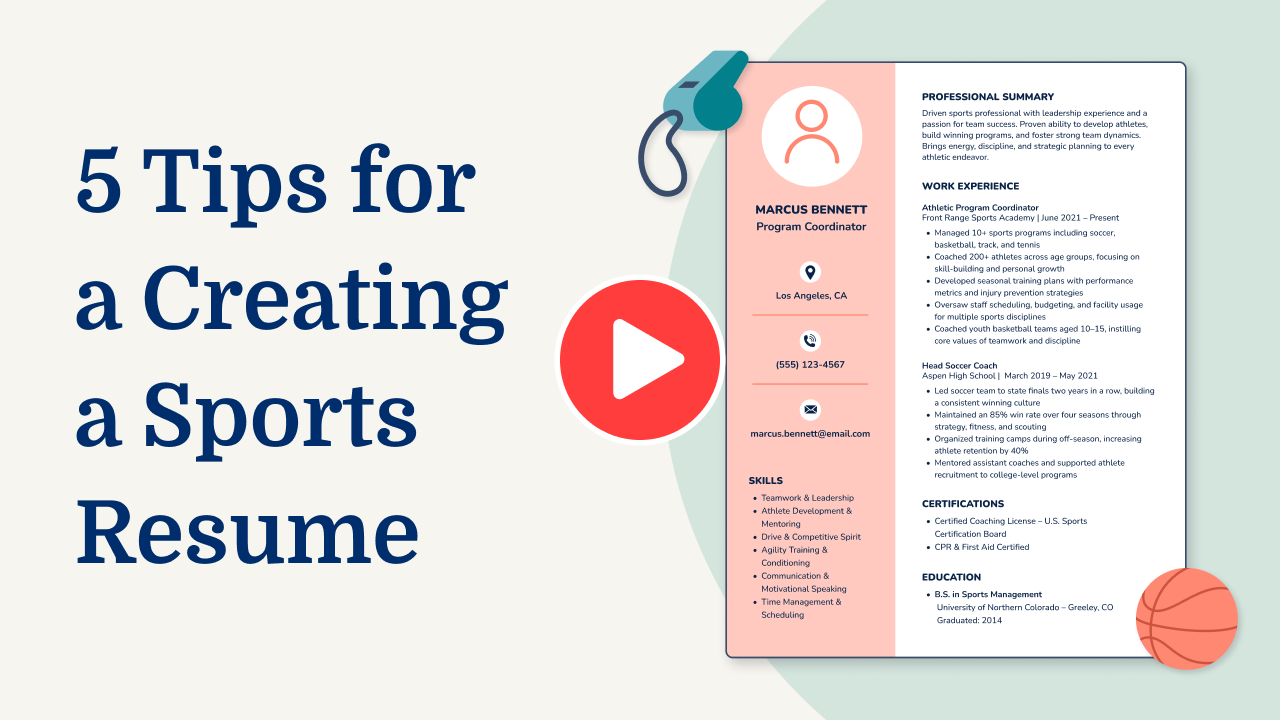
Write a strong professional summary
A professional summary on a resume acts as an introduction to hiring managers, offering a snapshot of the applicant’s qualifications and achievements.
This section typically consists of three to four sentences that highlight experience, skills, and achievements. It is ideal for experienced applicants who want to showcase their established professional identity and the value they can bring to a new role.
On the other hand, resume objectives are statements focused on career goals. They work well for entry-level applicants, those changing careers, or individuals with gaps in employment history. While summaries focus on “what I’ve accomplished,” objectives concentrate on “what I aim to contribute.”
Next, we’ll provide examples tailored to different industries and experience levels, illustrating how both summaries and objectives can be crafted effectively for roles like soccer coach and others.
Soccer coach resume summary examples
Entry-level
Recent graduate with a Bachelor of Science in sports management and a solid foundation in coaching principles and player development. Holds a USSF ‘E’ Coaching License and experience as an assistant coach for a local youth soccer team. Eager to apply knowledge of game tactics, skill drills, and sportsmanship to support young athletes in achieving their potential.
Mid-career
Passionate soccer coach with over six years of experience developing competitive teams at the high school level. Proven track record in implementing strategic training programs that have led teams to regional championships. Holds a USSF ‘C’ License and certified in CPR/First Aid. Recognized for mentoring players to improve technical skills and teamwork on and off the field.
Experienced
Accomplished soccer coach with more than 15 years of expertise leading collegiate teams to national tournaments. Possesses advanced tactical knowledge, holding both UEFA ‘A’ License and NSCAA Advanced National Diploma. Known for fostering a winning culture through leadership, innovative training methodologies, and talent development, resulting in numerous players advancing to professional leagues.
Soccer coach resume objective examples
Entry-level
Recent sports management graduate eager to start a career as a soccer coach, with a strong understanding of team dynamics and youth engagement. Passionate about fostering athletic skills and teamwork in young players through innovative coaching techniques and positive reinforcement.
Career changer
Dedicated educator transitioning into soccer coaching, bringing transferable skills in leadership and communication. Committed to inspiring young athletes by building supportive environments that encourage growth both on and off the field.
Enthusiastic beginner
Aspiring soccer coach with hands-on experience from volunteering at community sports programs, seeking to contribute energy and fresh perspectives to a youth soccer team. Focused on developing player potential through structured practice sessions and strategic game planning.
Create a standout soccer coach resume quickly! Use our Resume Builder to highlight your coaching skills and experience in just a few clicks.
Include relevant certifications and training
For a soccer coach, listing certifications and training on your resume is important because it shows you have the skills and knowledge needed for the job. It also helps you stand out from others who might not have the same credentials.
Certifications show that you’ve learned special techniques or strategies that can help your team succeed. Having a dedicated certifications section makes it easy for employers to see your qualifications quickly.
- United Soccer Coaches National Diploma
- UEFA B Coaching License
- CPR and First Aid Certification
- USSF C License
- Positive Coaching Alliance Certification
These certifications are valuable because they prove you are ready to lead and teach players effectively. They make sure you know the rules of the game well and can train players safely. Including these in your resume helps show you’re prepared for success as a soccer coach.
Example of a certifications section
US Soccer National C License
Issued by: United States Soccer Federation (USSF)
Issued 2021
UEFA B License
Issued by: Union of European Football Associations (UEFA)
Expires 2025
NSCAA Advanced National Diploma
Issued by: United Soccer Coaches
Issued 2019
CPR and First Aid Certification
Issued by: American Red Cross
Expires 2026
Choose a polished resume template with standard fonts, straightforward section headings, and simple design elements to ensure your qualifications shine.
Showcase your work experience
Highlighting your work experience as a soccer coach allows employers to understand your past achievements and how you can integrate into their team. When outlining your work history, begin with your most recent role and proceed in reverse chronological order.
For each position, include the job title, employer’s name, location, and dates of employment. This structure helps anyone reviewing your resume easily track your career development.
Choose clear and compelling language to describe each role’s contributions. Rather than saying “helped improve team,” specify “developed training programs that increased team wins by 30%.” This approach highlights concrete accomplishments rather than merely listing responsibilities.
Always aim to incorporate numbers or specific examples to illustrate how you made a difference; this makes your experience more tangible and impressive.
Include significant duties such as planning practices, managing game strategies, or mentoring players on skills development. These are important aspects of being a soccer coach and inform potential employers that you’re ready for the role.
By selectively highlighting which experiences to share and presenting them effectively, you’ll strengthen your case for being the ideal job seeker for the coaching position.
5 soccer coach work history bullet points
- Coached a youth soccer team to win a regional championship, improving team performance by 40% over the season.
- Developed and implemented strategic training sessions that increased player endurance by 25% and skill levels by 15%.
- Scouted and recruited top talent, resulting in a 30% increase in team competitiveness and success rates.
- Managed game strategies and substitutions effectively, leading to an overall season win rate of 75%.
- Organized community outreach programs that boosted team visibility and attendance at games by 50%.
A resume format that highlights leadership, team management, and strategic planning can set soccer coaches apart.
Match your resume with the job description
Tailoring resumes to job descriptions is essential because it helps job seekers align their qualifications with what employers are seeking. It also increases the chances of passing ATS, which scan resumes for specific keywords and phrases from job postings.
Creating an ATS-friendly resume means including relevant keywords and phrases pulled directly from the job description. By matching these terms with your own skills and experiences, you improve your chances of being noticed by both the ATS and hiring managers.
To identify keywords, carefully read the job posting and look for skills, qualifications, or duties mentioned multiple times. For example, a soccer coach position might emphasize “team leadership,” “player development,” or “training programs.” Using exact phrases from the posting ensures alignment with employer expectations.
Incorporate these terms naturally into your resume by rephrasing responsibilities to match. For instance, instead of saying you “coached players,” write “developed training programs to improve player performance.” This approach makes your experience more relevant to the role.
Targeted resumes not only improve ATS compatibility but also improve how well you connect with hiring managers’ needs. When you customize your resume, you stand out as a strong match for the soccer coach position.
Make your resume shine! The ATS Resume Checker reviews your resume and offers quick tips to help you stand out to hiring managers.
FAQ
Do I need to include a cover letter with my soccer coach resume?
Yes, including a cover letter with your soccer coach resume can improve your application and make you more memorable to hiring committees.
A cover letter gives you the chance to express your passion for coaching and detail specific achievements or philosophies that align with the team’s goals.
If the club emphasizes youth development or a particular playing style, you can highlight your relevant experience or success in those areas.
Using a Cover Letter Generator can help craft a personalized and professional letter by offering step-by-step guidance based on your resume details.
Additionally, reviewing cover letter examples tailored to coaching roles can provide inspiration and ensure your letter effectively showcases your unique qualifications.
How long should a soccer coach’s resume be?
For a soccer coach, a one-page resume is often ideal, especially if you’re early in your career or have fewer roles to showcase. Highlight key skills like leadership, coaching certifications, and past successes with teams.
However, if you have extensive experience and achievements across different teams or leagues, a two-page resume might be more appropriate to capture all relevant details.
Ensure everything included directly relates to coaching effectiveness and demonstrates your impact on the teams you’ve led. To explore how long a resume should be for different roles and stages in your career, consider reviewing tailored examples and guidelines.
How do you write a soccer coach resume with no experience?
When crafting a resume with no experience for a soccer coach position, emphasize your transferable skills, passion for the sport, and any activities that show your leadership and teaching abilities. Follow these tips:
- Emphasize your knowledge of soccer: Showcase your understanding of game strategies, rules, and techniques, whether through playing experience at school, in local leagues, or recreationally.
- Include leadership or teaching roles: Mention roles like team captaincy, mentoring younger players, or leading practice drills. These demonstrate coaching potential even without formal experience.
- Highlight volunteer or community involvement: If you’ve volunteered at youth camps, assisted coaches informally, or helped organize soccer events, include these as examples of hands-on involvement.
- Focus on soft skills: Skills like communication, teamwork, patience, and adaptability are essential for coaching and should be clearly presented in your resume.
Rate this article
Soccer Coach
Share this page
Additional Resources
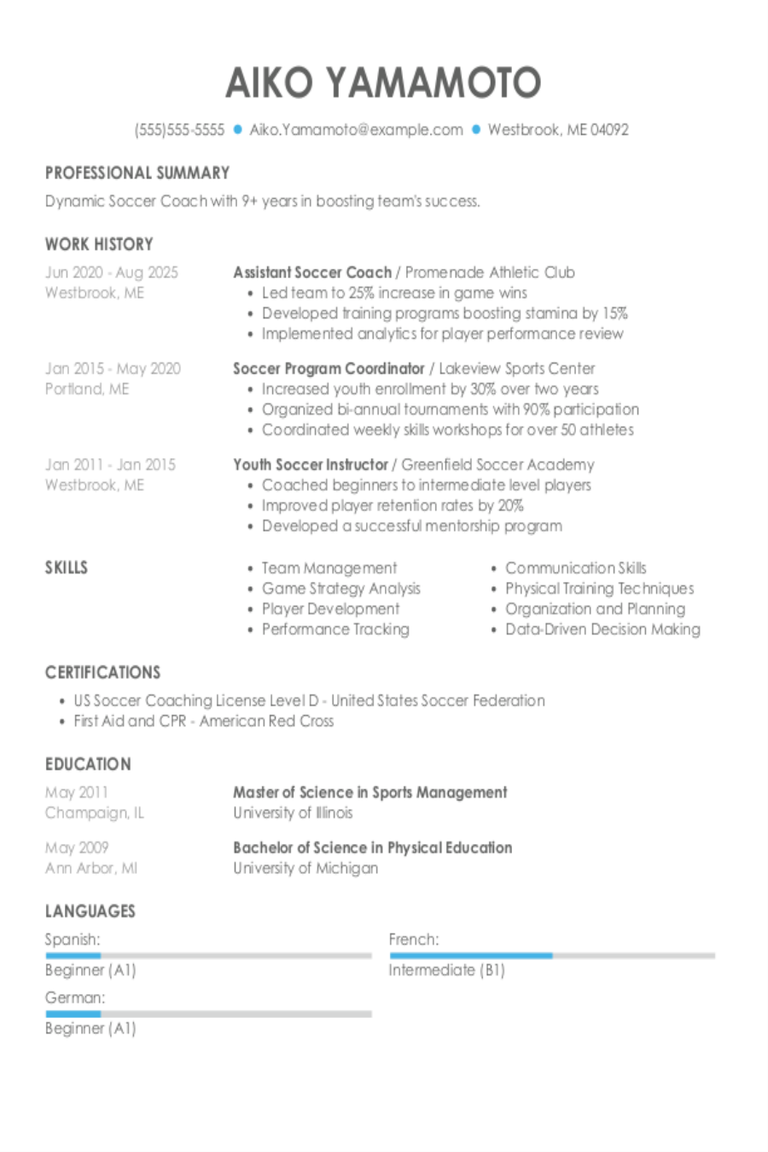
Assistant Soccer Coach Resume Examples & Templates
Explore assistant soccer coach resume examples and learn how to showcase teamwork, leadership, and game strategy knowledge to stand out in your job search.Build my resumeImport existing resumeCustomize this templateWhy
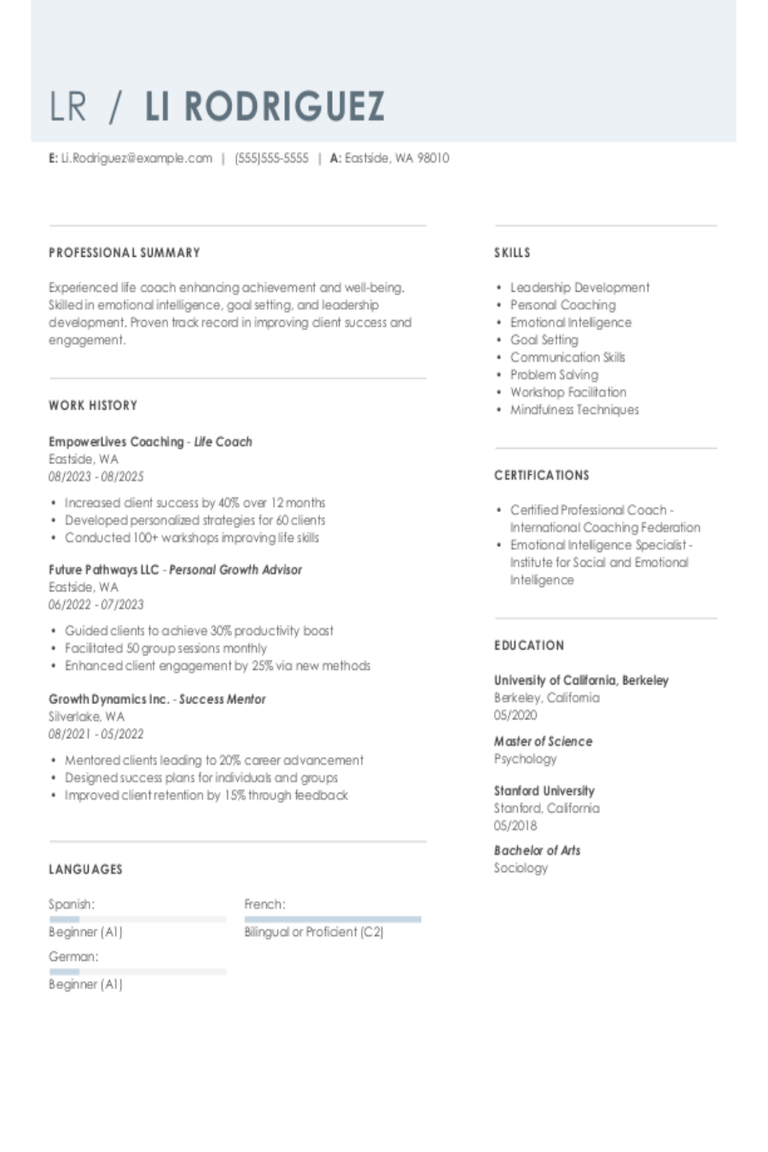
Life Coach Resume Examples & Templates
Discover life coach resume examples and tips that will help you create a resume that highlights your coaching skills and experience effectively.Build my resumeImport existing resumeCustomize this templateWhy this resume
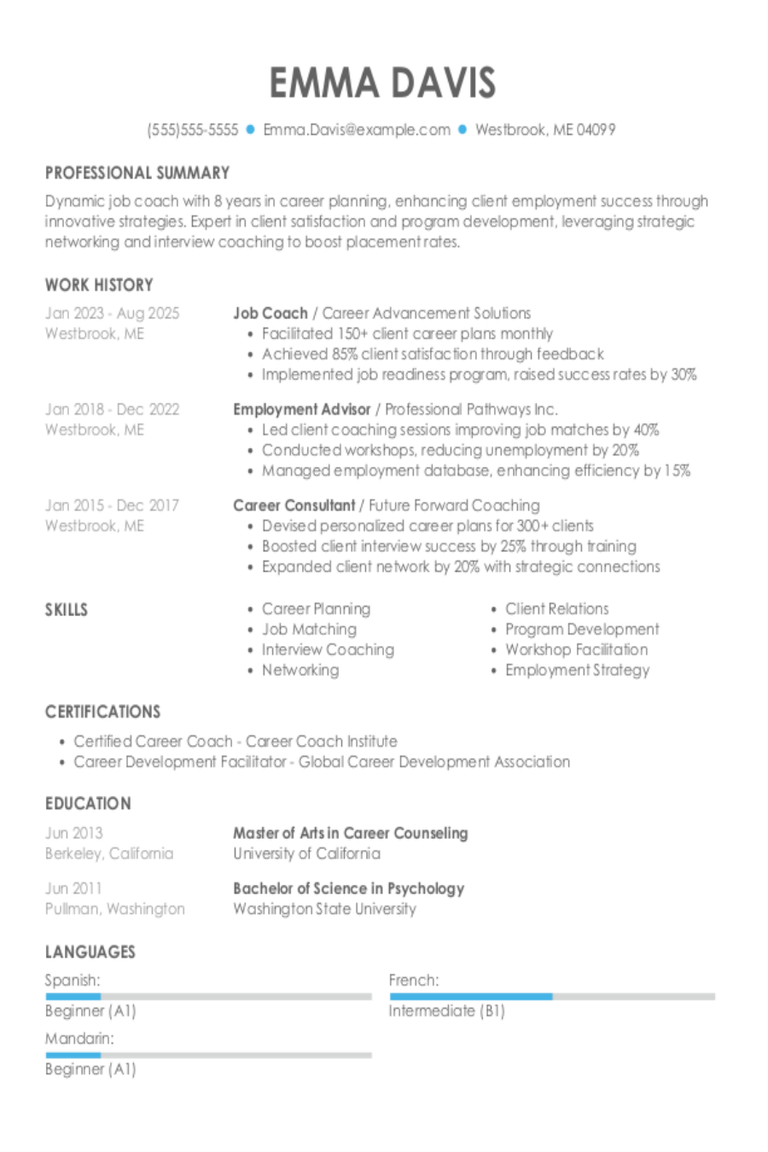
Job Coach Resume Examples & Templates
Browse job coach resume examples and learn how to highlight your coaching skills, experience with job placements, and success in helping clients achieve their goals.Build my resumeImport existing resumeCustomize this
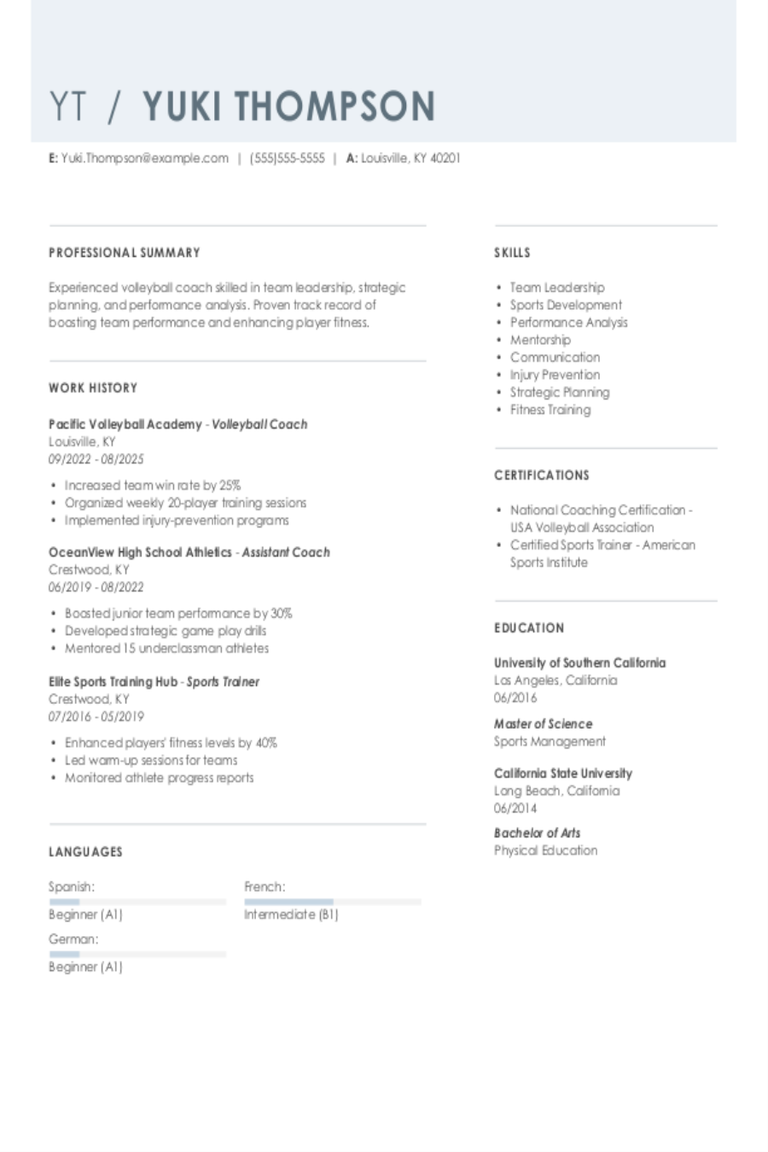
Volleyball Coach Resume Examples & Templates
Browse volleyball coach resume examples and tips to learn how to highlight your coaching skills, team leadership, and game strategy experience in a way that stands out.Build my resumeImport existing
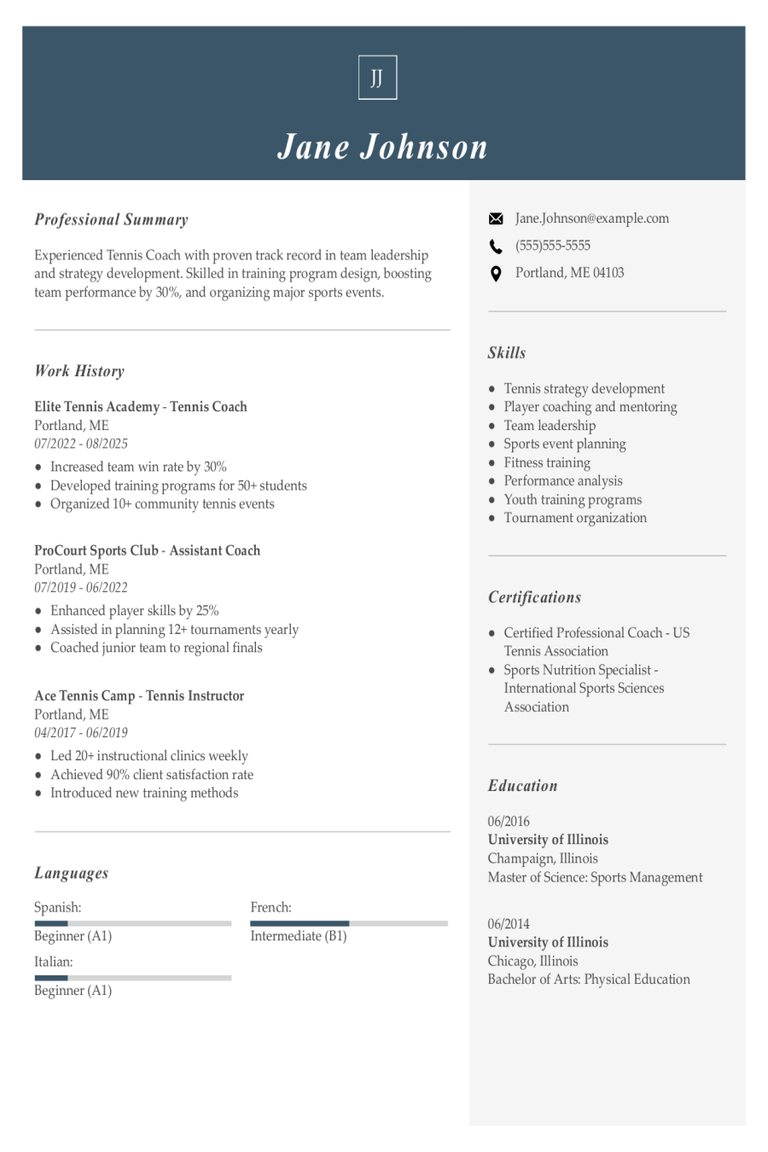
Tennis Coach Resume Examples & Templates
Discover tennis coach resume examples and learn how to highlight skills like teaching techniques, analyzing player performance, and planning training sessions.Build my resumeImport existing resumeCustomize this templateWhy this resume
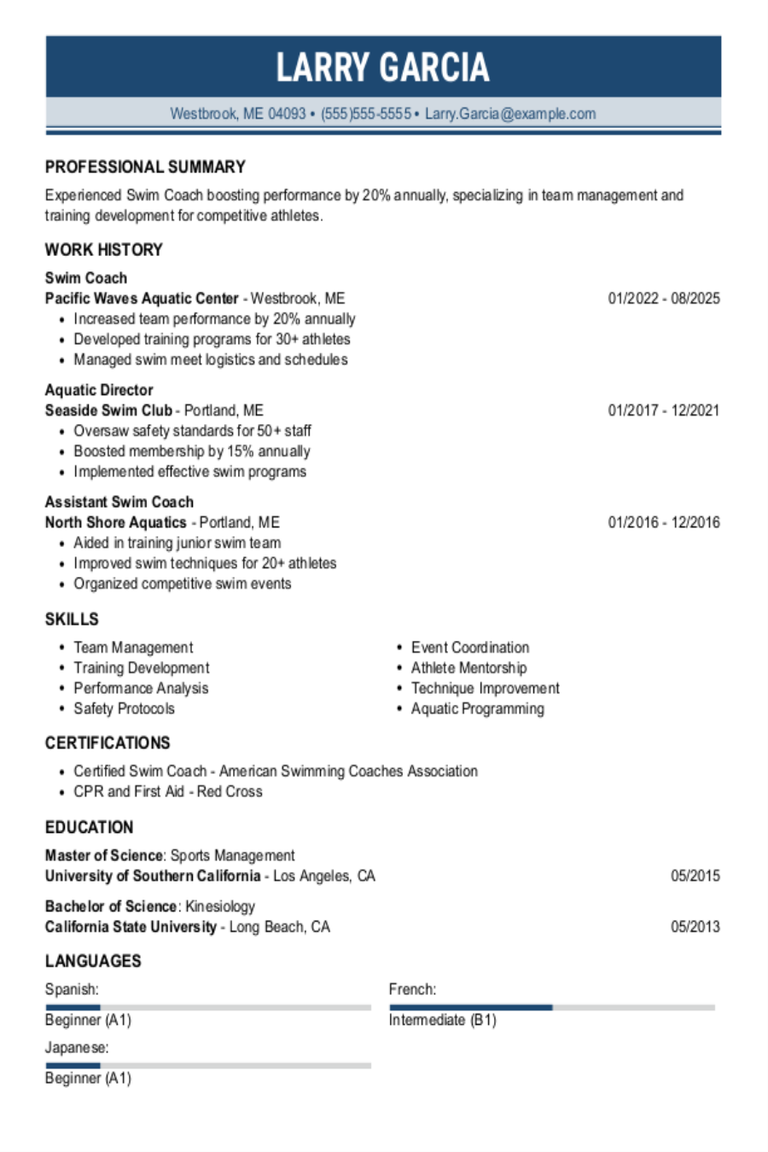
Swim Coach Resume Examples & Templates
Find swim coach resume examples that show how to highlight your training skills and experience with swimmers. Learn tips to showcase your ability to plan workouts, motivate athletes, and improve
